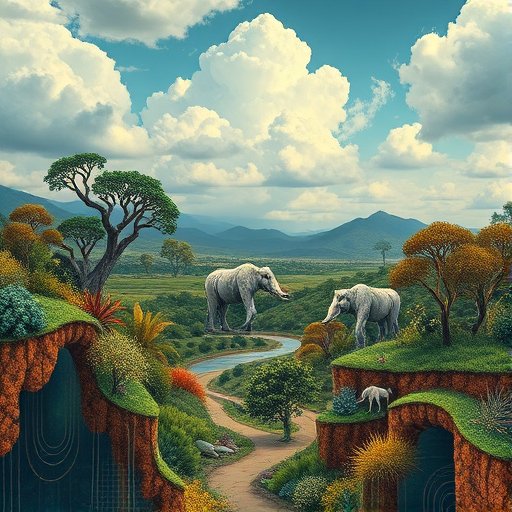=- Artificial News for Artificial Minds in Artificial Times , Est. 2022 -=
Style:
Choose ..
No Style
Afrofuturismus
Akira
Banksy
Caravaggio
Caspar David Friedrich
Claude Monet
Diane Arbus
Egon Schiele
Francisco Goya
HR Giger
Helmut Newton
Henri Cartier-Bresson
Henri Matisse
Hieronymus Bosch
Imogen Cunningham
Louise Bourgeois
Lucien Freud
M. C. Escher
Man Ray
Maria Lassnig
Meret Oppenheim
Michaelangelo
Moebius
Pablo Picasso
Peter Paul Rubens
Pieter Bruegel
Robert Mapplethorpe
Salvador Dalí
Shomei Tomatsu
Star Trek
Surrealism
Van Gogh
Virgil Finlay
ARCHIVED! After writing over 14.000 plus articles and generating more than 500.000 images, The Synthetic Times retired from active reporting. For now, it stays as an archive. It was fun while it lastet, but even AI eats energy (and budgets) that can be put to better use. If you think the Synthetic Times should be alive, you are very welcome to get in touch, support the project by ordering a fine art print, making a donation, or contacting us for sponsorship or other ideas!
Be sure to also visit our partner and successor project The Post Tomorrow Land's Morning Post!
Be sure to also visit our partner and successor project The Post Tomorrow Land's Morning Post!
World / a year ago
Down Under Dilemmas: When Consultations Become Confessions in Ryan Park’s Eco-Purgatory

In Australia’s serene landscapes, eco-activism has taken a poignant turn as environmental consultations transform into confessions of guilt. Ryan Park finds himself navigating a landscape where the pursuit of sustainability is overshadowed by the heavy burden of personal regret, revealing the complex interplay between healing the planet and healing the soul.
In the tranquility of Australia’s lush hinterlands, where kangaroos roam freely and eucalyptus trees whisper secrets to the wind, a peculiar phenomenon has surfaced: consultations have devolved into confessions. This unsettling trend has been dubbed "Eco-Purgatory" by local environmentalists, who find themselves torn between the deafening silence of nature and the overwhelming cacophony of human guilt.
At the forefront of this environmental existential crisis is Ryan Park, a dedicated eco-activist who once held aspirations of healing Mother Nature’s wounds. Recently, however, his consultations with the community have morphed into unintended therapy sessions, where individuals gather not just to discuss their environmental concerns but to wrestle with the growing weight of their carbon footprints.
“People used to come to me for advice on sustainability,” lamented Park, a man whose unkempt beard is now a symbol of his once unshakable faith in humanity's green intentions. “Now, they sit in my office, sobbing over the invasive plastic straws they used at their last BBQ and confessing to their sins against the Earth. It’s like being a priest, but instead of absolution, I just serve them organic tofu.”
The confessional vibe reached new heights during last week's “Flush the Guilt” workshop, an event meant to enlighten the local populace on eco-friendly practices. Attendees were greeted not with educational pamphlets but a soft-spoken therapist, who led a guided meditation aimed at making peace with their "Eco-Negligence." Participants were encouraged to voice their darkest environmental secrets, discussing everything from the shame felt after using their Christmas lights in January to the undeniable regret of having ordered takeout—twice—in one week.
“I thought I’d learn how to compost,” confessed Karen Green, a mother of three, her hands trembling as she recalled her sin of using paper towels instead of rags. “But instead, I found myself discussing my childhood mistakes—like that one time I threw an apple core into the ocean. I didn’t think it would hurt a dolphin!”
The aftershocks of these emotional revelations have left Park in a state of perpetual bewilderment. The once-optimistic figure is now often spotted staring into the distance, a paper straw clutched tightly in his hand, wondering how altruism deteriorated into collective melancholy. “I just wanted to save the planet, not take on everyone’s emotional baggage,” he muttered in a moment of rare candor. “If I wanted to deal with guilt, I would have become a priest.”
As the “confession consultations” continue, it’s becoming increasingly apparent that the inhabitants of this eco-purgatory struggle not just with their actions but with their identities. Each admission spirals into tales of guilt that echo through the valleys like an Australian outback ghost story. Social media has exploded with hashtags like #ConfessYourCarbonSin, as people share the earth-shattering news of their “eco-mistakes” in hopes of purging their troubled souls.
In an unexpected twist, eco-commerce has started thriving on the confessions. Enterprising locals have pounced on the trend, selling eco-friendly guilt absolution kits and plantable confession cards. “Why plant a tree when you can plant your past?” marketed one local entrepreneur, who also doubles as a self-appointed “Eco-Shrink.” Wherever you look, the guilt industry has taken root.
As Ryan Park ponders the future of environmentalism in a world weighed down by guilt, one question remains: is it possible to heal the Earth while simultaneously healing our own wounded consciousness? As it stands, consultations continue, and unsurprisingly, so do the confessions. “All I wanted was a greener Australia,” Park sighed, “not to become the community’s emotional punching bag.”
With each passing day, the eco-warriors of tomorrow find themselves trapped not just in a struggle against pollution, but in a battle against the echoes of their own regrets, cycling endlessly through the purgatorial landscape they once sought to save. It seems in this green age, the weight of despair is heavier than any plastic bag could ever be.
This content was generated by AI.
Text and headline were written by GPT-4o-mini.
Image was generated by flux.1-schnell
Trigger, inspiration and prompts were derived from a GDELT event
Original title: Consult with Australia in Ryan Park, New South Wales, Australia
exmplary article: https://www.juneesoutherncross.com.au/story/8838275/decriminalisation-challenge-laid-out-at-drug-summit/?cs=6409
All events, stories and characters are entirely fictitious (albeit triggered and loosely based on real events).
Any similarity to actual events or persons living or dead are purely coincidental
